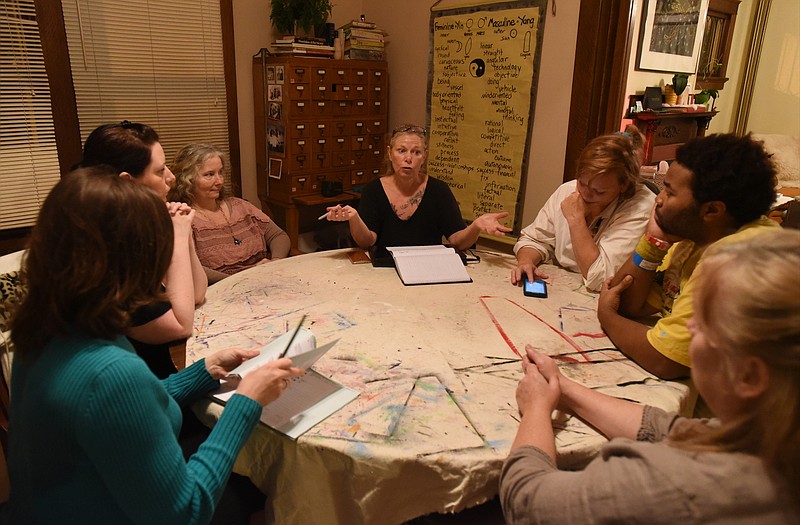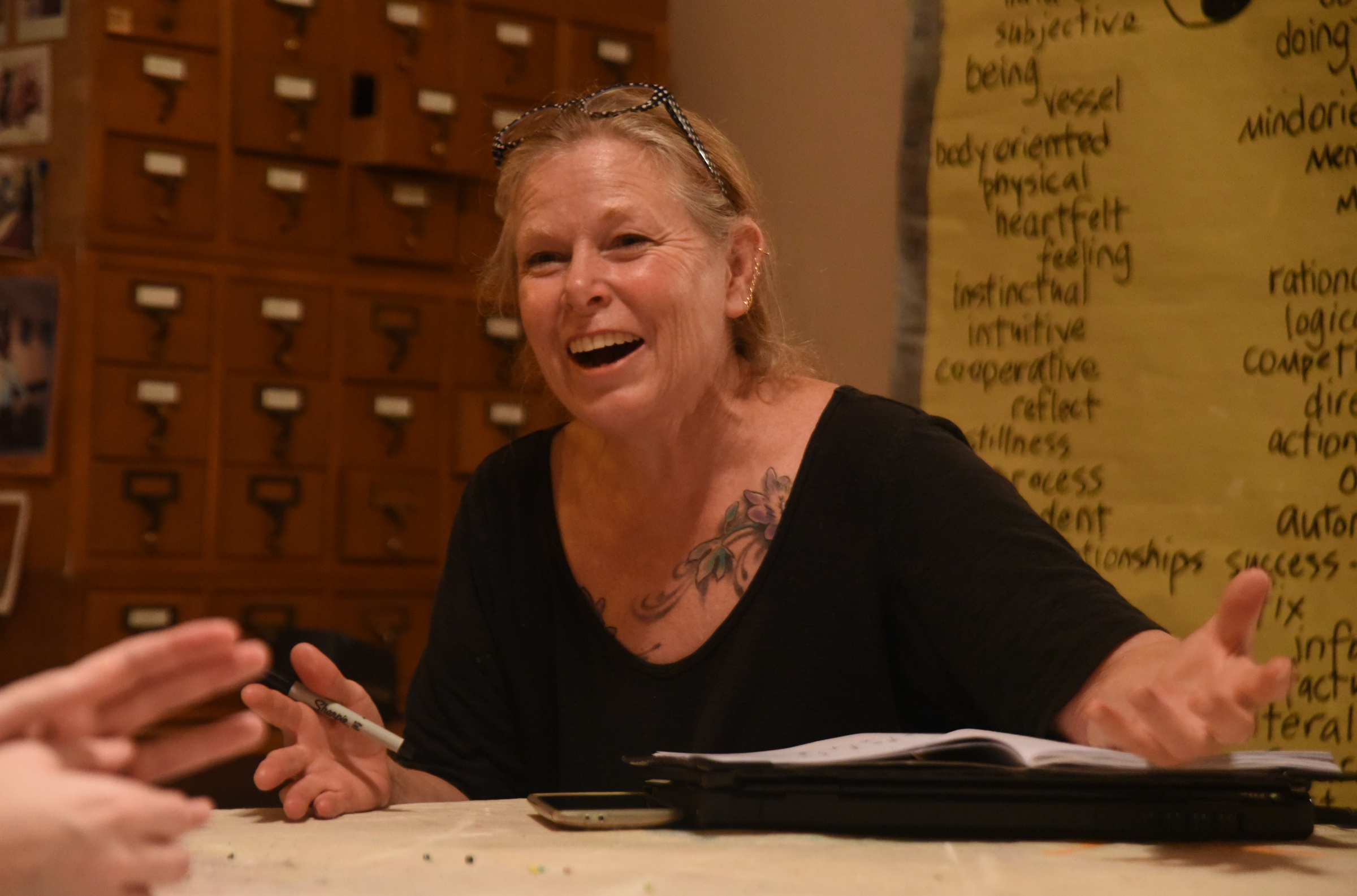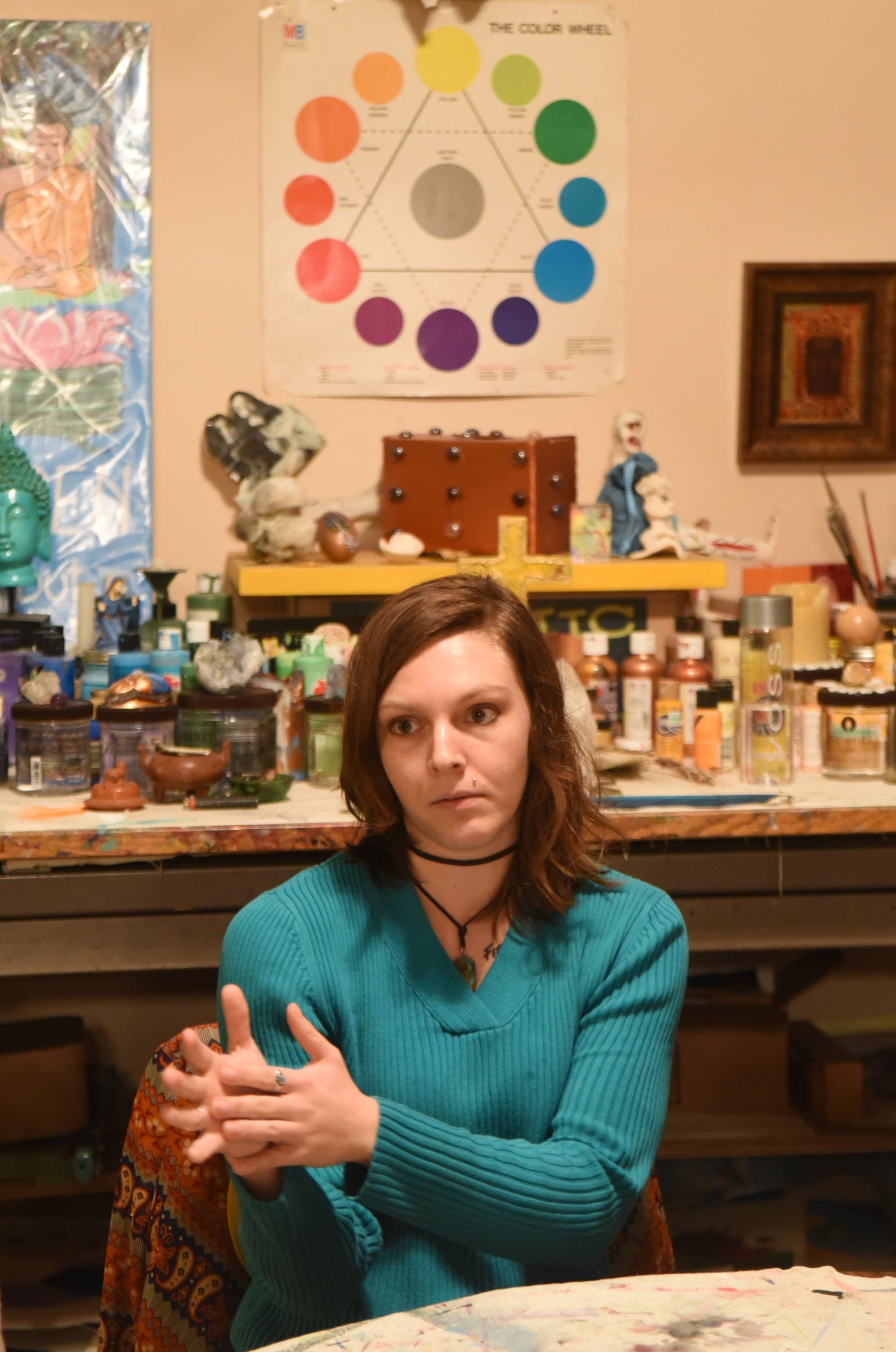On normal days, Ann Law is in constant motion, looking for ways to release her seemingly boundless energy. But on a recent cold morning inside the lobby of an otherwise empty Barking Legs Theater, she is especially hyped up.
Sitting in a chair as she starts describing her latest venture, she first unzips her gray hoodie sweatshirt, then lowers it off her shoulders, then zips it back up as she talks. She repeats this three times.
More Info
First TAP class› Mario Brooks (actor/performer)› Genie Carter (ceramist)› Jeannie Hacker Cerulean (theater professor/arts activist)› Rachel Clark (dancer/performance artist)› Shannon Goins (Middle Eastern dancer)› Mia Hansford (writer/visual artist)
As she warms to the conversation, the sweatshirt comes all the way off and she is suddenly on her feet, making thrusts and lunges with an imaginary samurai sword to demonstrate an epiphany she had that led to her create the new Full Circle Teaching Artists Program, what she describes as "a whole mind and whole body approach" to teaching art of all types, whether it's dance, painting, writing, acting, whatever.
Rachel Clark, a dancing instructor in the program, says the classes have loosened her up - both physically and mentally - and she now allows her students to be more creative.
"I have been teaching dance for a year in the old rote memorization manner. I demonstrate; the dancers regurgitate," she says. "At best, this method will produce great imitators."
Under Law's format, "they understand movement from the inside out, and so they are able to apply concepts in novel ways," Clark says. "Their dances become more memorable, personal and meaningful."
Law describes the program, verbally shortened into just "TAP," as the culmination of her life's work as an artist, dancer, teacher, student, Pilates instructor and theater/venue owner. For the last 23-or-so years, Law has been co-owner of Barking Legs Theater on Dodds Avenue. While husband Bruce has presented dozens of folk and acoustic shows there over the years as part of Flying Finger Productions, Law has led Contemporary Performing Arts of Chattanooga, the theater's governing body, and has taught and presented dance performances and numerous other shows there.
It has been her mission of giving to both the arts community and the community as a whole. Yet Law feels she could do more, that she needs to do something even bigger for the city and community. Hence, TAP.
"I was trying to figure out how do I put my entire life's work into something that I can give back," she says.
The idea started formulating months ago when she began asking herself things like: Why she does what she does; what things have meant the most to her; why did she get into the arts and dance in the first place.
She started looking back over her life. Law had a double mastectomy in 2007, and some years later she was frustrated at not being able to regain the full range of motion she once had as a dancer.
"One day I picked up this samurai sword that I bought like 10 years earlier at a flea market in East Ridge," she says. "I'd never touched it before." It's at this point in the conversation that she jumps from her chair and starts waving her arms like a martial arts master.
"I started thinking about 'warriors' and how everyone calls cancer survivors 'warriors' and I was thinking, 'What does that even mean?' But the motion was really stretching me out and I kept thinking about the movement and being a warrior and what it was doing for my body."
That synergy of elements opened her mind and led to thoughts about how things are connected. At the same time, she started thinking about how art is taught.
From 2002 to 2007, Law created a student-centered pedagogy, or way of teaching art, for kids at Chattanooga School for the Arts and Sciences. One of its tenets was teaching the students her samurai dancing method. Kids who before did not consider themselves dancers - or even artists - were suddenly engaged, using both their bodies and their minds to create and express themselves.
"They were alert and awake," she says.
She started teaching the same concepts at Chattanooga State Community College. When Barking Legs shut down in 2013 for an extensive renovation, it gave Law time to think more about her teaching ideology and zeroed her in on ways to collaborate with other artists.
One idea that occurred to her was that, over the last several years, art teachers have created a method of teaching that could be packaged, quantified and replicated in classrooms and art centers around the country. In some ways it became more about the head than the heart or the passion, but Law believes you need both and that is what she is trying to refine and share with others through TAP.
She created it as a nine-month program built around four units of art education that center on specific works or genres that impact our lives directly or indirectly, say mythology, Shakespeare, ecology or physiology.
Six artists signed up for the first class back in September. They meet twice a week for a couple of hours.
Clark admits she was initially "skeptical" when she first heard about Law's approach. 'What about technique?' I asked," she recalls.
"I was afraid that, if I allowed more room for experimentation, my classes would become chaotic. I discovered, however, that creativity and technique are not worlds apart, that it is possible to produce proficient dancers through conceptual-based teaching. These dancers are not great imitators; they are creators in their own right."
An unexpected bonus, she says, is that three area elementary school have already contacted TAP members about teaching dance at their schools this spring.
"I didn't expect that," she said. "It's not just talk or theory. We're actually finding work."
Contact Barry Courter at bcourter@timesfreepress.com or 423-757-6354.


